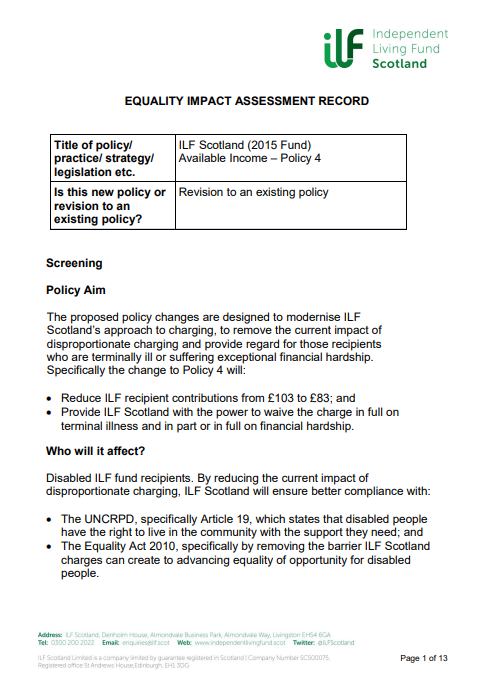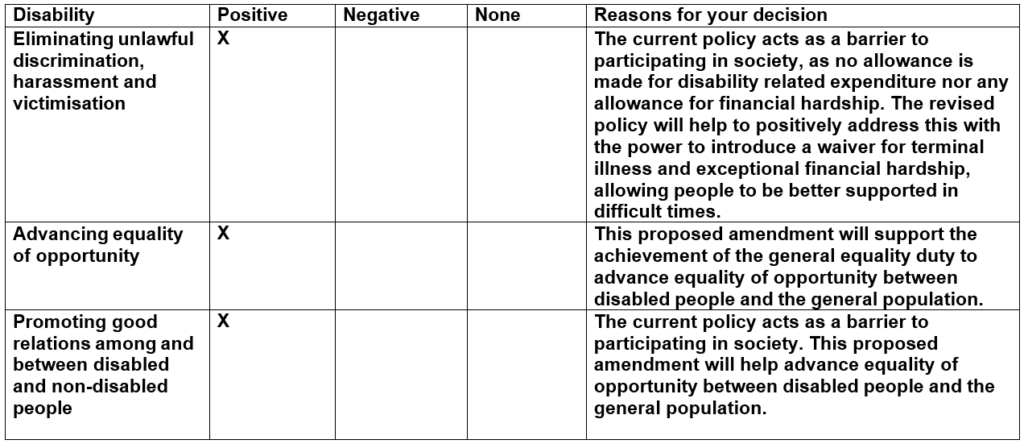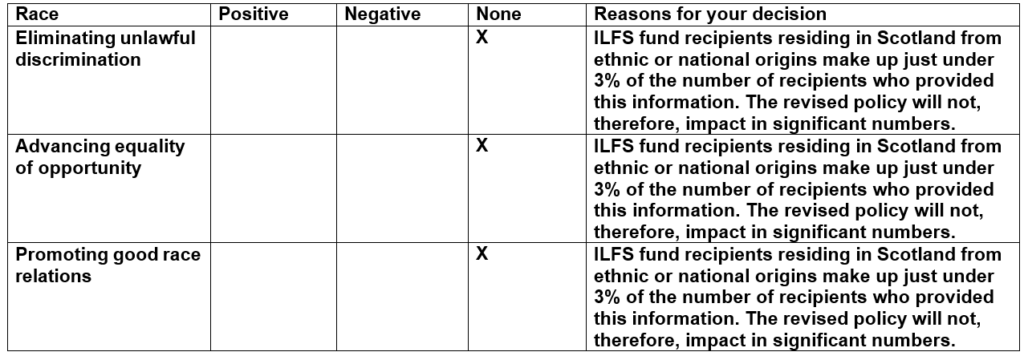
This EQIA, for our 2015 Fund, has been archived but is available for reference purposes.
To see existing policies and EQIAs guiding ILF Scotland, visit our main policies page.
Title of policy/ practice/ strategy/ legislation etc.
ILF Scotland (2015 Fund) Available Income – Policy 4
Is this new policy or revision to an existing policy?
Revision to an existing policy
The proposed policy changes are designed to modernise ILF
Scotland’s approach to charging, to remove the current impact of disproportionate charging and provide regard for those recipients who are terminally ill or suffering exceptional financial hardship. Specifically the change to Policy 4 will:
Disabled ILF fund recipients. By reducing the current impact of disproportionate charging, ILF Scotland will ensure better compliance with:
It will also allow for closer alignment with:
Providing ILF Scotland with the power / discretion to waive or reduce charges will directly and positively impact on those fund recipients who are terminally ill or who are experiencing exceptional financial hardship.
There is a potential risk of some local authorities introducing / increasing charges to ILF Scotland recipients following implementation of this revised policy 4. This would offset any intended benefit to ILFS recipients. There is a safeguard in place however, in that local authorities cannot fall below the Minimum Threshold Sum without loss of award. There will also be discussion with COSLA on obtaining its support for this revision.
The negative impact of the existing policy 4 has been discussed extensively with fund recipients, ILFS Stakeholder group, ILF Board, senior staff, assessors and caseworkers. A significant number of ILF recipients report financial hardship as a consequence of the current policy. It is frequently reported to assessors at ILF reviews that many adults who transition from home to an independent living setting remain financially dependent on their family to sustain adequate independent living outcomes. The proposed policy changes are supported by all concerned as a way of reducing the negative effect of disproportionate charging on disabled people in receipt of an ILF award.
Having reviewed the data and considered the impact, we concluded that we need to analyise the impact of our policy fully on the Age and Disability characteristics as the policy does not impact on any of the others. ILF
Scotland will continue to engage externally and gather evidence on the impact of the revised policy 4 in furtherance of our equality duty of eliminating discrimination, promoting equality of opportunity and fostering good relations.
Include here the results of your evidence gathering (including framing exercise), including qualitative and quantitative data and the source of that information, whether national statistics, surveys or consultations with relevant equality groups.


1 Refer to Definitions of Protected Characteristics document for information on the characteristics
Having considered the data and evidence you have gathered, this section requires you to consider the potential impacts – negative and positive – that your policy might have on each of the protected characteristics. It is important to remember the duty is also a positive one – that we must explore whether the policy offers the opportunity to promote equality and/or foster good relations.
Do you think that the policy impacts on people because of their age?

Do you think that the policy impacts disabled people?

Do you think that the policy impacts on men and women in different ways?

Do you think that the policy impacts on women because of pregnancy and maternity?

Do you think your policy impacts on transsexual people?

Do you think that the policy impacts on people because of their sexual orientation?


Do you think the policy impacts on people because of their religion or belief?

Do you think the policy impacts on people because of their marriage or civil partnership?

2 In respect of this protected characteristic, a body subject to the Public Sector Equality Duty (which includes Scottish Government) only needs to comply with the first need of the duty (to eliminate discrimination, harassment, victimisation and any other conduct that is prohibited by or under the Equality Act 2010) and only in relation to work. This is because the parts of the Act covering services and public functions, premises, education etc. do not apply to that protected characteristic. Equality impact assessment within the Scottish Government does not require assessment against the protected characteristic of Marriage and Civil Partnership unless the policy or practice relates to work, for example HR policies and practices.
Identifying and establishing any required mitigating action

3 See EQIA – Setting the Scene for further information on the legislation.
Describing how Equality Impact analysis has shaped the policy making process
Our Equality Impact assessment has helped shape our revised policy 4. The changes of reducing the level of contribution and introducing the waiver for those who are terminally ill or experiencing exceptional financial hardship will impact directly in a positive way on ILF recipients. Our data and evidence gathering through the EQIA process will ensure that we continue to work directly with disabled people, representative bodies and our partners to ensure that all concerned fully understand the equality impacts of our policy intentions. Understanding our analysis and implementing the subsequent policy changes will help us to achieve better outcomes for people and communities.
Monitoring and Review
ILF Scotland, Head of Policy, will ensure that this revised policy is reviewed in line with ILF Scotland’s standard policy review schedule and will specifically monitor and measure the impact on disabled people.
Please confirm that:
Yes
Yes
Not applicable
I am satisfied with the equality impact assessment that has been undertaken for Available Income – Policy 4
Name: Linda Scott
Position: Head of Policy
Authorisation date: 21 September 2018